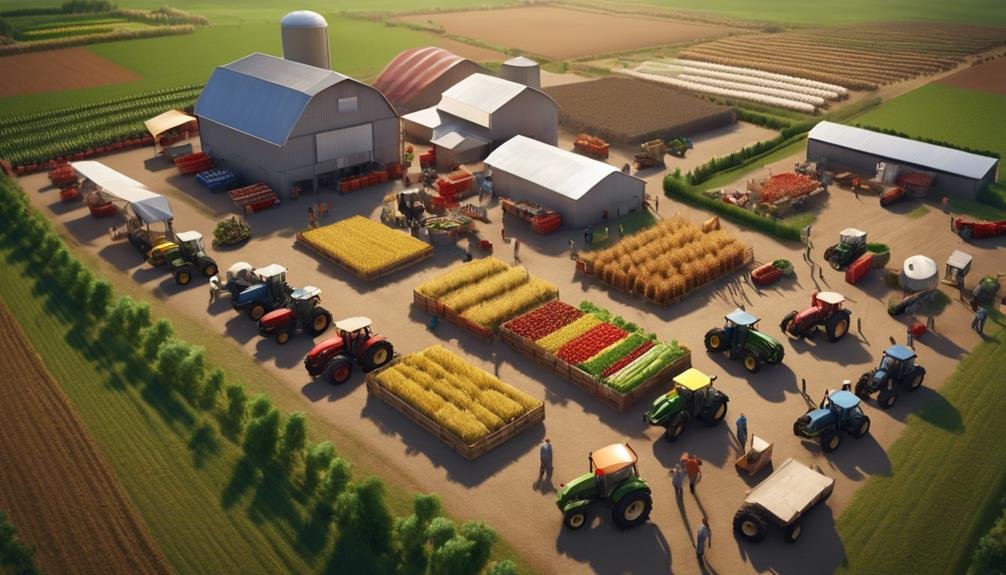Agribusiness Explained: What It Is, Challenges, and Examples
Agribusiness, a complex interplay of agricultural and business practices, is an essential sector necessary for sustaining our global food supply. Facing multifaceted challenges ranging from environmental concerns to market volatility, this industry demands innovative solutions to thrive in an ever-changing landscape. As we explore the nuances of agribusiness, we uncover the intricate web of challenges and opportunities that shape its trajectory. Stay tuned as we unravel the intricacies of this dynamic field, shedding light on its key players, evolving trends, and transformative technologies that drive its growth and resilience in the face of adversity.
Key Takeaways
- Agribusiness fusion of agriculture with business principles for production, processing, and distribution.
- Challenges include climate change, global competition, urban expansion, and environmental impact.
- Notable examples: Deere & Company, Bayer, and ADM driving innovation in agribusiness.
- Technology crucial for operational efficiency, sustainability, and addressing climate change impacts.
- Future trends: genetic modification, industry consolidation, tech-driven practices, and sustainability focus.
Agribusiness: Definition and Scope
Agribusiness, the dynamic fusion of agricultural practices with strategic business principles, encompasses the entire spectrum of production, processing, and distribution within the farm-based goods sector.
The scope of agribusiness is vast, offering numerous opportunities for growth and development. With the increasing global population and changing dietary preferences, there is a growing demand for innovative solutions in agriculture. This presents opportunities for agribusinesses to expand their operations and explore new markets.
The impact of agribusiness on the economy is significant, contributing to job creation, income generation, and overall economic growth. As the industry continues to evolve, embracing technological advancements and sustainable practices, agribusiness is poised for continuous growth and adaptation to meet the challenges of the future.
Key Challenges in Agribusiness
Amidst the dynamic landscape of the agricultural industry, key challenges in agribusiness emerge as pivotal factors influencing the sector's sustainability and growth trajectory. Climate change presents a significant obstacle, impacting crop production and livestock, necessitating the adoption of sustainable practices.
Global competition further intensifies the pressure on farming sectors, leading to rapid fluctuations in agricultural product prices. Additionally, the decreasing availability of arable land due to urban expansion poses a challenge to the industry's expansion.
Furthermore, agribusiness's contribution to greenhouse gas emissions underscores the urgency for businesses to adapt and mitigate their environmental impact. Successfully addressing these challenges is essential for the agribusiness sector to thrive in the face of evolving market dynamics and environmental concerns.
Role of Technology in Agribusiness
The integration of cutting-edge technology has become indispensable for enhancing operational efficiency and competitiveness within the agribusiness sector. Innovative solutions such as bee vectoring technology for plant protection, drones for farm tasks, and robotics with GPS and moisture sensors are revolutionizing traditional practices. These technologies not only streamline operations but also contribute to sustainable practices by reducing emissions and adapting to climate change challenges.
Notable Agribusiness Examples
Notable examples within the agribusiness industry showcase a diverse range of companies, from family-owned farms to multinational corporations, each playing a substantial role in shaping the sector's landscape.
Industry pioneers like Deere & Company, known for manufacturing farm machinery, have revolutionized agricultural practices.
Companies such as Bayer, leading seed and agrochemical manufacturers, have a considerable global market presence.
Additionally, food processing giants like ADM contribute significantly to the industry's value chain.
These examples highlight the diverse nature of agribusiness activities, ranging from agritourism to biofuels, catering to the evolving demands of the global market.
The presence of these key players underscores the industry's importance in meeting domestic and international food needs while driving innovations and sustainable practices.
Future Trends in Agribusiness
With the agribusiness landscape continuously evolving and facing challenges such as climate change impacts and global market forces, future trends in the industry are poised to reshape how food production, distribution, and sustainability practices are approached.
Genetic modification is expected to play a significant role in enhancing crop yields, resistance to pests, and adapting to changing environmental conditions. Industry consolidation is another trend on the horizon, with smaller farms increasingly being absorbed by larger agricultural entities, leading to more streamlined operations and improved economies of scale.
These shifts indicate a move towards more efficient and technology-driven practices in agribusiness, as companies seek to meet the growing demands of a changing world while ensuring long-term sustainability and profitability.
Conclusion
To sum up, agribusiness is a dynamic sector that integrates agricultural practices with strategic business principles to meet global demands. Despite facing challenges such as climate change and global competition, companies like Deere & Company, Bayer, and ADM are leading the way in innovation and sustainability.
The future of agribusiness lies in genetic modification, technology-driven practices, and industry consolidation to guarantee long-term profitability and sustainability. As the industry evolves, adaptation and innovation will be key to success.







